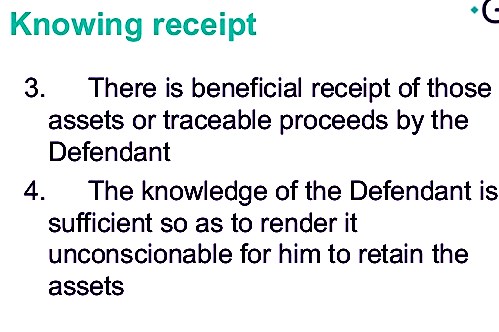
Simply put, a party cannot, with knowledge of a trust, receive trust property in breach of that trust: see Citadel General Assurance Co. v. Lloyds Bank Canada, [1997] 3 S.C.R. 805 (S.C.C.).
The elements of the doctrine of knowing receipt were summarized by the Ontario Court of Appeal in Waxman v. Waxman (2004), 186 O.A.C. 201 (Ont. C.A.), leave to appeal refused [2004] S.C.C.A. No. 291 (S.C.C.), at paras. 553 as follows:
“The elements of the doctrine of knowing receipt are set out in the Perell article, supra, at 110: a trust or fiduciary relationship; the third party receiving property from the trust or fiduciary relationship in his or her own personal capacity; and the third party having actual or constructive knowledge that the property was transferred in breach of trust or fiduciary duty. Thus liability for knowing receipt does not extend beyond the property which the third party knows (or is deemed to know) has been received in breach of trust or fiduciary duty.”
This doctrine was also discussed by the Supreme Court of Canada in Gold v. Rosenberg, [1997] 3 S.C.R. 767, [1997] S.C.J. No. 93 (S.C.C.) 22 In Gold v. Rosenberg , Iacobucci J. explained:
“26 A person who has not been appointed as a trustee may, under certain circumstances, attract the liabilities of trusteeship. In Barnes v. Addy (1874), L.R. 9 Ch. App. 244, Lord Selborne L.C. explained that there are three situations in which a breach of trust may give rise to liability in a person who is a stranger to the trust.
First, a person may be liable as a trustee de son tort. The facts of this case do not require consideration of this category of liability.
Second, a person will be liable if he or she knowingly assisted in a fraudulent and dishonest breach of trust. This type of liability is referred to as “knowing assistance”.
And third, depending upon considerations of notice, equity may impose liability if the defendant received, in his or her own right, property obtained through breach of trust. This last category of liability is referred to as “knowing receipt”…
41 The essence of a knowing receipt claim is that, by receiving the trust property, the defendant has been enriched. Because the property was subject to a trust in favour of the plaintiff, the defendant’s enrichment was at the plaintiff’s expense. The claim, accordingly, falls within the law of restitution. As Denning J. said in Nelson v. Larholt, [1948] 1 K.B. 339, at p. 343:”
In Citadel General Assurance Co. v. Lloyds Bank Canada, [1997] 3 S.C.R. 805 (S.C.C.) the court outlines a two-part test for liability:
liability under the doctrine of “knowing receipt” requires a stranger to have received monies for his own use or benefit and requires the stranger to have knowledge or constructive knowledge — i.e. the stranger knew or should have known — that the funds were received by him unlawfully. In order for Lloyd to be liable in “knowing receipt” for the amount of monies directed to his invoices, the plaintiff has to establish that Lloyd knew, or ought to have known that the monies paid against his account were owing to Nash.



